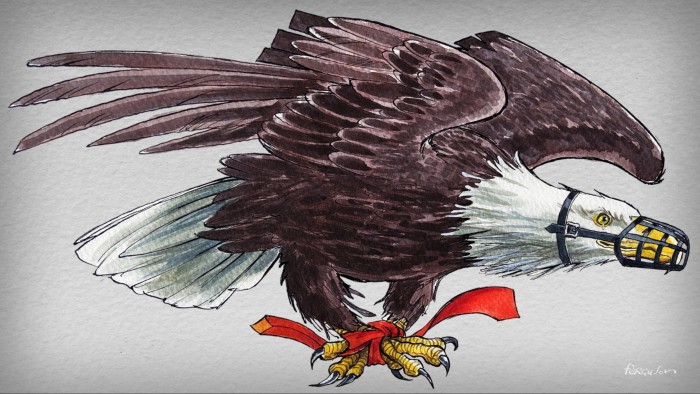Unlock the White House Watch newsletter for free
Your guide to what Trump’s second term means for Washington, business and the world
Sometimes one must look at the big picture. On July 4 2026, the US will celebrate its 250th year of independence. The declaration of independence itself stated that: “We hold these truths to be self-evident, that all men are created equal, that they are endowed by their Creator with certain unalienable Rights, that among these are Life, Liberty and the pursuit of Happiness.” These ideas were imperfectly realised. A civil war and the civil rights movement were still to come. Yet the birth of the United States of America was to be a hugely significant moment.
The US had the potential to become the first truly mighty republic since the Roman one, which perished at the battle of Actium in 31BC. Without US power, a German or a Russian dictatorship would have surely conquered Europe. Without the US example, democratic capitalism would not have spread across the world. This would be a far poorer world, beset by all the ills of despotism.
As I argued in a 2016 column, Donald Trump’s arrival on the political scene puts all this at stake. The peril is far closer today. He survived his attempt to overthrow the result of the 2020 presidential election, to return triumphantly in 2024. Trump is unchained. The energy of this administration is transforming the world.
Let us start with the domestic front.
We are watching an assault on the rule of law. Abbe Lowell, erstwhile defender of Jared Kushner and Hunter Biden, warns that Donald Trump is pushing US democracy to breaking point. Actions include executive orders against law firms and the appointment of unqualified loyalists to key positions. Most ominous of all, as Edward Luce notes, is the expansion in the power and resources of Immigration and Customs Enforcement, which operates very much like a secret police.
Closely related has been the assault on the government. Elon Musk’s so-called Department of Government Efficiency was a fraud. The goal was not efficiency but subservience. It was to destroy the independence of public servants. In the process many valuable activities were also destroyed, notably USAID’s health programmes. The costs will be huge.
Yet another aspect is Trump’s extensive use of emergency powers and executive orders. He has made 168 of the latter in just the first few months of this term, bringing his total far above those of his recent predecessors. Trump rules by decree. That is one of the signs of a dictatorship. (See charts.)
A further concern is legitimisation of corruption. Arguably, this is revealed in his own behaviour and that of his family. It is also shown in the pause in enforcement of the Foreign Corrupt Practices Act, once an example of good behaviour.
Yet more fundamental is the war on science, a potent source of US exceptionalism. Stanford’s Larry Diamond, a leading expert on democracy, writes: “The scope and depth of the devastation Trump is wreaking on American leadership in science and technology is so massive and sweeping that it is hard to understand without resorting to a preposterous theory, such as that Trump is an agent not of imperial Russia but of Communist China”.
Last but not least is the fiscal policy just enacted in the “One Big Beautiful Bill Act”. This guarantees huge fiscal deficits into the indefinite future. That, in turn, also ensures huge current account deficits forever, since these are how the US economy balances supply and demand.
Now turn to the impact on US international relations and global public goods.
Above all, the trade war is not over. The 90-day pause on “liberation day” tariffs is due to come to an end. Deals have not been reached with more than a handful of partners. This economically destructive war on US creditors and, above all, the uncertainty it creates, will continue. The trade war represents an assault on the institutions created by the US after the second world war. It is also damaging US alliances. More broadly, all US commitments are in doubt: Volodymyr Zelenskyy’s grotesque humiliation in the White House showed that.
The trade regime was a global public good. Another has been the dollar-based monetary regime. Again, Trump’s policies cast doubt on the stability of the currency and the credibility of its issuer. Last but not least, though fully in line with the movement’s assault on science, is the virulent climate “denialism”: if it is inconvenient, it cannot be true, is the motto. The obvious historical parallel is with Lysenkoism, the ruinous Stalinist campaign against evolutionary biology.
Almost everything being done by Trump will weaken the US in its rivalry with China. This rivalry can and must be managed in the interests of all. But I, for one, desperately want the core values of freedom of opinion, democratic politics, the rule of law and openness to the world as a whole to survive. Trump is not just assailing these values at home, he is weakening them abroad, notably by destroying US credibility as an ally. How can one reasonably expect a fickle and fiscally profligate US, which is destroying core institutions and values, to match a giant with more than four times its population? This is surely a fantasy.
In just under six months, only an eighth of his term, Trump has made huge strides in his war on everything that made the US successful. Only the Maga base, Vladimir Putin and Xi Jinping should feel happy. The most coherent part of the programme is the attempt to turn the US into an autocracy. Much of the rest is incoherent. But, given the evident success, in his own terms, of just his first six months, it would be a rash person who assumed that this counter-revolution against all the US represents, at home and abroad, will fail. One can hope. But Trump is doing terrifyingly well.









